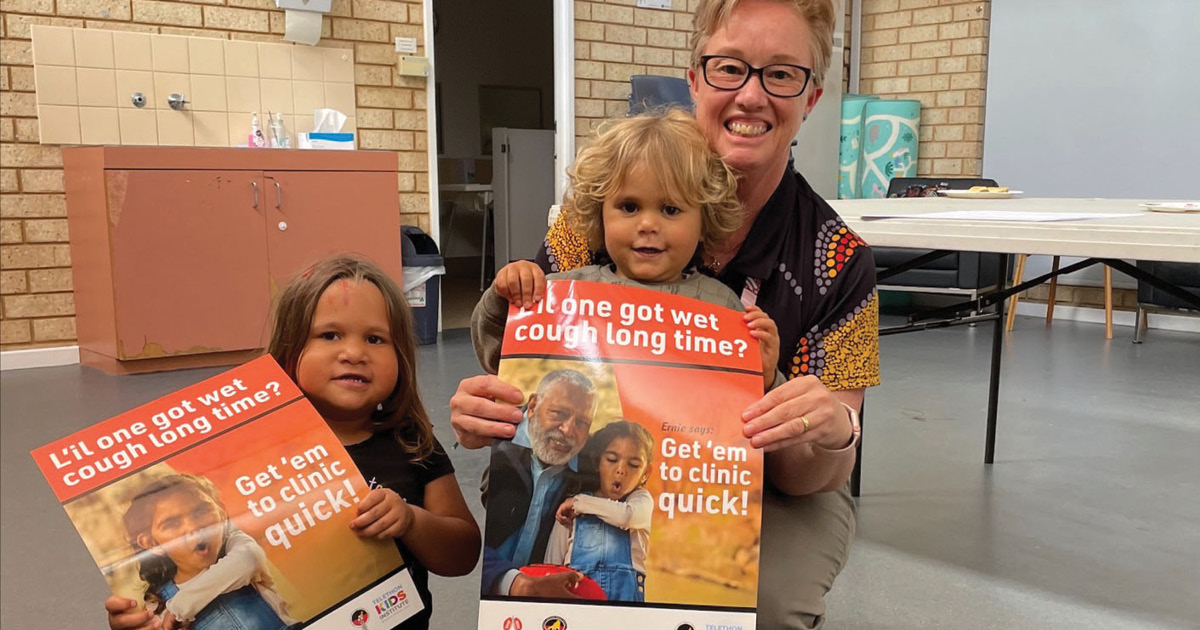A program aimed at raising awareness of the dangers of a chronic wet cough in Aboriginal children has been extended to 14 remote and regional towns in Western Australia - thanks to a partnership between The Kids Research Institute Australia and Cystic Fibrosis WA.
A wet cough experienced by a child for more than four weeks can be a sign of underlying infection known as protracted bacterial bronchitis (PBB). If left untreated, this can lead to permanent, life-shortening lung damage known as bronchiectasis.
Recent research undertaken by respiratory clinician researchers Professor André Schultz and Dr Pam Laird – from the Wal-yan Respiratory Research Centre and Perth Children’s Hospital - identified PBB in 10 per cent of Aboriginal preschool children in communities in the West Kimberley region of Western Australia.
The Kids’ BREATH (Building Respiratory Equity for Aboriginal and Torres Strait Islander Health) team has partnered with Aboriginal medical services, Aboriginal families, and clinicians in communities in the Kimberley region of WA, Derbarl Yerrigan, Wiluna, Northern Territory and Queensland to co-design and implement chronic wet cough information campaigns which are culturally meaningful and sustainable within these communities.
The aim of the campaigns is to raise awareness and develop solutions for timely detection, accurate diagnosis, and optimal management of chronic wet cough in Aboriginal children – with the ultimate aim to improve the lung health of Aboriginal kids.
Alongside this research, Cystic Fibrosis WA (CFWA) is continuing its work to deliver this important health message to many regional and remote communities throughout Western Australia, using resources developed by The Kids and Aboriginal communities, made possible with funding from Telethon and other supporters.
CFWA’s Education and Outreach Lead Michelle Buck and her team have been connecting with health professionals, educators, and community members to deliver the program, now in its third year, to share culturally secure materials such as flip charts, posters, banners, flyers, stickers, badges, videos, and training materials.
“At CFWA, we are passionate about applying our knowledge and skills to help build better lung health across WA. We are excited about expanding our capabilities to provide valuable services to people with other respiratory conditions beyond cystic fibrosis,” Mrs Buck said.
“In 2022 we expanded our funding and services to enable this by delivering
a pilot community-based chronic wet cough education program in regional WA.
“It’s been extremely valuable to be able to draw on the work that The Kids’ BREATH team has done in partnership with Aboriginal communities, and to use the range of resources developed as part of the team’s research so far to deliver this important health message.
Our long-term goal is to empower a network of local navigators to ensure ongoing awareness of chronic wet cough in the community, and through this partnership we have begun to make solid tracks.
Since the beginning of CFWA's community-based chronic wet cough education program, the team has:
- Visited 24 regional towns
- Met with 154 health professionals
- Yarned with more than 62 community groups
- Trained 21 people to become chronic wet cough community champions
- Delivered 311 resource packs to both community and events
Next steps
- CFWA received further funding from Channel7 Telethon Trust and other supporters in 2024 to enable this important work to continue
- The BREATH team will evaluate the wet cough health promotion campaigns delivered in the Kimberley region of WA, Derbarl Yerrigan, Wiluna, Northern Territory and Queensland.
- If the campaigns prove to be successful, it is hoped that the campaign together with the implementation approach can serve as a guide for raising awareness and improving management of chronic wet cough in Aboriginal children right across Australia.

